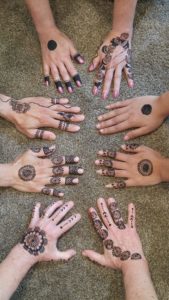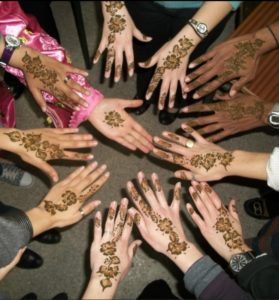Muhibbah’s Henna Night on Campus!


Muhibbah club organized a Henna Night on campus. It was my first experience to be a part of a henna night in the United States. I observed that here, Henna is considered an art that is applied to bodies with the artwork by the help of paper utensils. However, in Pakistan henna holds special cultural significance. Henna is traditionally applied for special occasions like holidays, birthdays and weddings. The most popular tradition is the Mehndi (Henna) Night where the bride and her family and friends get together to celebrate the wedding, and apply Henna on her hands. Pakistani tradition holds that for as long as the henna stain appears on the bride, she doesn’t have to do any housework. Also, the darker the stain the better the marriage, and the more the mother-in-law will love her. Moreover, I saw different colors of Henna here filled in plastic bottles while in Pakistan, people practice making Henna at home. The leaves of the henna plant are dried, crushed into a fine powder, and made into a creamy paste using a variety of techniques. This paste is then applied to the skin, staining the top layer of skin only. In its natural state it will dye the skin an orange or brown color. Although it looks dark green (or dark brown depending on the henna) when applied, this green paste will flake off revealing an orange stain. The stain becomes a reddish-brown color after 1-3 days of application. It was a fun night on campus. Everyone applied designs of their choice.
